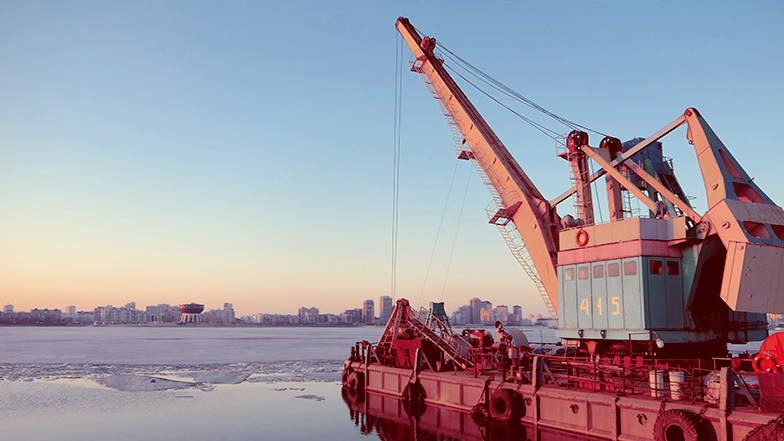
Did you know that 90% of everything you own was brought to you by ship?
In fact, some of the biggest ships in the world can carry up to 18,000 shipping containers, full of clothing, electronic equipment, and much more.
However, for such a major, worldwide industry that is so essential for commerce, not a lot of people consider about shipping as a viable career option.
We spoke to shore-based shipping recruitment specialists, Spinnaker Global, to find out more about the changing state of the shipping industry, and some of the top jobs you can find to get you started:
Why choose the shipping industry?
Whether you have previous sailing experience, or you’re completely new to commercial shipping, the industry has such a diverse range of roles that there’s something out there to suit all skillsets.
The opportunities within the shipping industry are evolving, too. For example, once viewed as an industry that lagged behind modern technology, there are now roles available in ballast water management (ensuring the safety of water taken in as ballast in port), digital, and social media marketing.
There are also environmental roles; shipping is the least environmentally damaging form of commercial transport, and thanks to new initiatives, there has been a substantial reduction in marine pollution over the last 15 years.
Even if you’re not much of a seafarer, there are a number of shore-based roles out there which might be the perfect fit for you. Here are five areas you could move into:
Shipbroker
What they do: Competitive shipbrokers are the intermediaries between (i) shipowners and the charterers who hire their ships; and (ii) the buyers and sellers of ships – Sale & Purchase (S&P) Brokers.
What you need: Nowadays, most employers look for graduates, but some of the best brokers and charterers have no qualifications at all. Excellent networking and sales skills, as well as the ability to build trust, will be key to this role. ICS qualifications are highly regarded as on-the-job training and as a route into broking and chartering.
What you can earn: Professionals earn around £50,000 a year. They earn a commission of 1.25% of the ‘freight’ paid per tonne to carry the cargo from A to B or of the daily ‘hire’ paid to hire the ship for a certain period, which can be anything from weeks to several years. S&P brokers earn a commission of 1% of the sale price of the ship. REMOVE?
Perfect for: People with excellent negotiation skills.
Operations
What they do: This is a challenging one to summarise. The operations team in any type of business is all about support, co-ordination, communication, administration, customer service and back-up. Let’s be honest, they’re the ones who make things run smoothly.
What you need: Organisation skills, a calm approach and persistence. Most junior recruits nowadays are graduates, often with shipping degrees. Junior deck officers also stand a good chance.
What you can earn: Entry level / junior positions start at around £20,000 a year.
Perfect for: People who consider themselves ‘the organised one’.
Superintendent
What they do: Traditionally superintendents have been chief engineers on ships who have come ashore. They are primarily responsible for planned and unplanned maintenance and costs, dry docking and major repairs, vessels surveys and audits, budgets, supervising vessels’ crews, environmental compliance, overseeing vetting inspection results, investigating breakdowns, accidents and damage, and a number of other variables.
What you need: Seagoing experience as a senior engineering officer or a degree in engineering/ naval architecture or possibly shipyard/engine manufacture experience. While in the past superintendents needed to have been a chief engineer to gain the respect of the chief engineers on ships they manage, seagoing experience is no longer a necessary requirement.
What you can earn: Typically between £40,000 and £65,000 a year.
Perfect for: People who always put safety first.
Claims Handler / Manager
What they do: To each organisation a claim means something different. In P&I (protection and indemnity), whose role it is to insure liability claims, handlers form the majority because their role is to defend claims of owners. For owners, the claim suggests that they have damaged something. Volume claims tend to be found in the liner industry, while the higher value, but lower in number claims are in the cargo segment.
What you need: Personality, discretion and good communications skill are obviously important to persuade underwriters to take a piece of business or to pay a claim.
What you can earn: Managers earn an average of nearly £60,000 a year.
Perfect for: People who have a head for numbers.
Shipping law
What they do: It depends which country you’re in. In England at least, the ‘umbrella’ term is “lawyer”. Within that we have solicitors and barristers. Generally, solicitors deal with and represent the clients and barristers are appointed via a solicitor to represent those clients in court.
What you need: The traditional route to qualification is a law degree (LLB) followed by the one year Legal Practice Course (LPC) leading to professional examinations at the end. If you don’t have a law degree, you can do a one year conversion course (sort of a post-graduate law degree) called the Common Professional Examinations (CPE). Quite a few master mariners work as ‘marine’ or ‘admiralty managers’ in law firms, where they practise wet shipping law. Many of them take no legal qualifications at all and although they are not lawyers as such, they do a full legal job, learning on the job as they go.
What you can earn: Qualified lawyers typically earn around £90,000 a year.
Perfect for: People who are interested in the criminal justice system (and, you know, ships).
Considering a career in shipping? Apply for a job with Spinnaker Global today.
Spinnaker Global are specialists in shore-based shipping recruitment, executive search, and HR consulting. HR Consulting at Spinnaker also founded the Maritime HR Association – a membership body that compiles reliable shore-based salary data.





